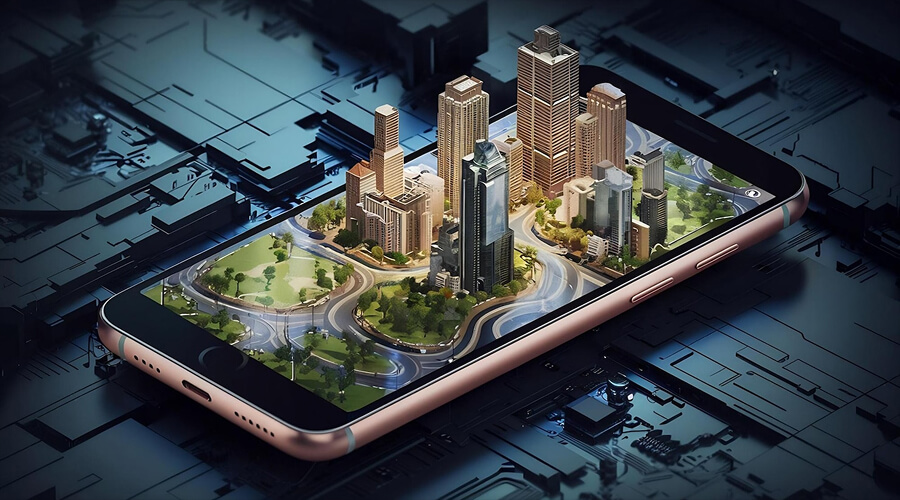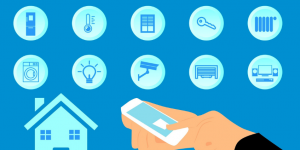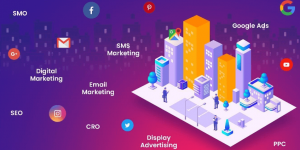
Technology is changing the way we buy, sell and experience real estate. With AI-driven property analysis, virtual tours and blockchain-supported transactions, the sector is moving quickly as it has never done before. This blog gives an in-depth examination of how technology is transforming the real estate – turning it smarter, more transparent and exceptionally customer-focused.
Enter any modern real estate office today, and you can instantly feel the change. Days of heavy paper files, manual contracts and long visits to the property are gone. It is all digital, instant, and data-driven.
Technology has taken centre stage in the property sector. It is not merely about transforming the relationship between the agents and buyers, but it is also about redefining what can be done. Smart homes, AI-based pricing, and technology have redefined the efficiency, transparency, and experience rulebook.
Innovation has introduced speed and clarity in a business that was once characterised by slow, paperwork-intensive processes. Consumers are now doing virtual tours of houses. Sellers use insights to sell better. Analytics enables investors to discover the next big opportunity, all at the touch of a button.
Let’s examine how technology is defining the future of the real estate industry with one click, one algorithm and one experience at a time.
1. PropTech: The Core of Real Estate Innovation

PropTech, or property technology, is at the heart of this change. It is not only a buzzword, but it is a revolution. PropTech is a broad concept that includes online real estate platforms as well as AI valuation technology and IoT-based smart homes.
The goal is clear: to make real estate development faster, smarter and more accessible. Sites such as Zillow, Housing.com and Redfin have already transformed the way individuals shop for houses. Buyers are no longer browsing through newspaper ads, but filter their properties by budget, location, amenities, and even by commute time.
PropTech saves time on manual work, which is important to real estate agents and businesses. Listings update in real-time. The leads are automatically tracked. Market intelligence is created at the touch of a button. It’s efficiency redefined.
Such a shift is not only time-saving, but it also creates trust. Data-driven platforms help to reduce ambiguity, making sure buyers and sellers make informed choices. That is all in an industry where trust is the foundation.
2. Artificial Intelligence: The Brain Behind Smart Decisions
The future is already here, and it is AI. The impact of AI in real estate is transforming how agents and investors make smarter, data-driven decisions. Predictive analytics can process millions of data points—such as location trends, demographics, local prices, and even buyer sentiment—to forecast property values and market demand.
Imagine knowing the neighbourhoods that are going to flourish in five years. That’s the power AI offers. Virtual assistants and chatbots are driven by natural language processing, provide a 24/7 response to client queries. AI assists in making the process of buying a home easier and more intimate by scheduling the viewings and offering instant mortgage guidance.
Even the valuation of property is getting intelligent. The algorithms can calculate the prices more precisely than the old ones did, relying on the current data instead of the old measures.
3. Virtual Reality (VR) and Augmented Reality (AR): The New Way to Tour Homes

Imagine you are sitting in the living room, and you are wearing a VR headset, and touring a luxury apartment in Dubai or a villa in Goa. You can walk through rooms, sit on the balcony and even imagine your furniture in the room.
VR and AR have transformed the experience of the buyer in terms of property. They remove the necessity of visiting numerous sites and purchasing across long distances without difficulties.
VR is now being used by developers to display properties that are in the process of construction. The final project can be experienced by the buyers before a single brick has been laid. AR goes a step further, superimposing digital images onto real-life areas to have clients view design, colour combinations or floor alterations in real-time.
For the real estate business, VR and AR enhance sales conversion and reduce marketing expenses. To customers, they transform imagination into experience, which photos and brochures would never accomplish.
4. Big Data and Analytics: Turning Insights Into Strategy
The real estate business is based on information, such as market prices, trends in buyers, rental returns, and demographics of the neighbourhood. But, until recently, all that data were scattered, unorganised, and underused.
Nowadays, Big Data is transforming that. It allows the real estate companies to work with bulk data and detect trends, which can be more intelligent decisions.
For example, analytics can reveal where young professionals are moving to, where rent growth is the fastest, or where an infrastructure project will increase property value. The information helps businesses to set investment plans, marketing efforts and pricing.
Even at the customer side, data is used to personalise experiences. Portals can offer property suggestions that perfectly match the specific lifestyle of a purchaser, whether it be the proximity to schools, exercise centres, parks or places of work.
5. Blockchain: Bringing Trust and Transparency
There is only one thing that real estate has never been good at, and that is trust. The industry has been plagued by lengthy paperwork, fraud and hidden costs.
With blockchain in real estate, all transactions are safely stored and authenticated on a decentralised registry. No more fake listings. No more tampered documents. All the operations, such as ownership change to contract signing, can be tracked and are unalterable.
The contract will automatically execute when some requirements are met (such as money received), and no intermediaries are involved; the contract is executed instantly.
Countries such as Dubai and Sweden already trial blockchain registries of land. This is good news to global investors because they are able to complete deals across borders at a faster rate and have lower legal risk. In the near future, blockchain can form the basis of real estate transactions worldwide.
6. Smart Homes and IoT: Living in the Future

The Internet of Things (IoT) is making smart homes transform the way we live. These houses are able to regulate lights, temperature, and security using voice commands or smartphone applications.
IoT is of huge value to developers. A house with intelligent gadgets, such as smart locks, appliances with a low energy consumption rate, and movement sensors, becomes instantly more appealing and green.

To homeowners, it has the advantage of being convenient, secure and reducing payments. Imagine getting a notification when there is a leak in the water or having the ability to turn the lights on and off. With the development of IoT, real estate is no longer going to be sold as space but as experience.
7. Cloud Computing: The Invisible Infrastructure
Cloud computing enables real estate firms to store large volumes of data in a safe manner, work remotely, and also scale without problems. Virtual tours, document management, and all these are smoother on the cloud.
Agents can access property information everywhere, update their entries in real time, and interact with customers without any issues. CRMs on the cloud also simplify the task of handling leads, sales, and client relationships.
For businesses, cloud solutions mean reduced costs, enhanced security, and 24/7 accessibility. To customers, it means quick service and continuous experiences
8. Mobile Technology: Real Estate on the Go
We live in a mobile world, and real estate is not left behind. House hunting is now a swipe-and-tap affair through mobile apps. Buyers are able to browse, compare, chat with agents and even make arrangements to visit them virtually, and all this is through their smartphones.
For realtors, mobile applications introduce agility. Agents can answer queries in real-time, run listings and close deals quickly. Push notifications make the clients interested and updated.
This mobile-first concept has also increased market penetration. Smaller agencies can also compete with the big players by using user-friendly mobile experiences.
9. Sustainability Tech: Building a Greener Future
The future of real estate is not only digital, it is sustainable. Technology is helping developers to come up with environmentally friendly buildings that reduce waste and energy consumption. Sustainability technology has now been a massive selling point, be it in the form of smart thermostats and solar panels, or other green building materials.
The AI and IoT applications utilise the resources to the maximum; they monitor the air quality, water consumption, and energy efficiency in real-time. Not only does this save money, but it also aligns with the growing environmental concerns amongst consumers and investors.
Sustainable technology will not be a luxury in the years to come; it will be the norm. And the first to adopt it will be ahead of the next generation of growth.
Conclusion
The real estate business has entered a new digital era. Technology is not a support system any more, it is the engine. AI-driven insights, blockchain-driven security, virtual tours, and smart homes that are sustainable; each innovation introduces a dimension of speed, openness, and smartness.
For businesses, it is not a choice but a matter of survival. The future belongs to innovation, automation, and humanisation. Technology does not simply change the way we either sell or buy property at the end of the day; it transforms the way we feel at home.






